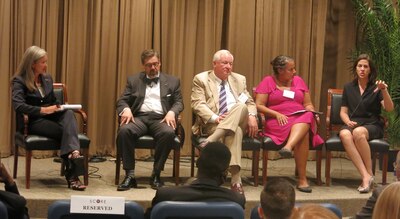After years of focusing on academic standards, testing and evaluations, education leaders are giving teacher preparation a fresh look in Tennessee.
Since 2010, the state has transformed teachers’ classroom experiences by overhauling standards, remaking the rubric by which teachers are observed and evaluated, and revising the tests used to assess students.
Now, the Tennessee Department of Education and State Board of Education are going back to the beginning — how teachers are prepared in the 40 or so educator programs across the state. They range from traditional four-year undergraduate schools to alternative programs such as Teach For America and Memphis Teacher Residency.
The topic was front and center Monday during a forum in Nashville organized by the State Collaborative on Reforming Education, or SCORE. The event was attended by state and district administrators and elected officials, as well as researchers.
Here are some of the ideas highlighted:
- Strengthen partnerships among preparation programs and school districts. These entities need to work together to make sure programs are producing the kinds of teachers that districts need, said Amy Wooten, director of educator licensure and preparation for the State Department of Education. For example, if districts are facing a shortage of teachers for English language learners, it’s crucial that teacher preparation programs are recruiting and training people interested in ELL. But the partnership shouldn’t end with selection. Research shows that candidates who spend time in classrooms through residencies and student teaching fare better once they’re full-time teachers. And even once districts hire the teachers, districts and programs should work together to help newbie teachers navigate their first year in the classroom.
- Recruit more teachers of color. In 2013-14, nonwhites comprised 15 percent of those who completed educator preparation programs in Tennessee. That compares with about 35 percent of Tennessee students who are non-white, with higher rates in the state’s largest school districts. Having more teachers of color is proven to engage students of color, but it’s also good for white students and teachers by exposing them to different experiences and shattering racial stereotypes, said Boston University researcher Travis Bristol. The Department of Education is creating specific goals for recruiting more non-white teachers, and wants all programs to have their own goals, Wooten added.

- Reduce barriers into teacher prep programs. Key to increasing the diversity of Tennessee’s teaching corps is making teacher prep more accessible to students from low-income backgrounds. One way is promoting scholarships and pathways from community colleges to four-year programs, said Wooten and State Board member Mike Edwards. In recent years, the state has raised the minimum GPA and ACT scores for teacher preparation programs, but there’s a catch-22. While those measures seem to predict how students perform as teachers, they might say more about their financial background, blocking great teachers from entering the profession. “I’m more concerned about excellent graduates than excellent (high school metrics),” said Tristan Denley, vice chancellor for academic affairs at the Tennessee Board of Regents.
- Change outcomes used to evaluate teacher prep programs. Just as test scores might not tell the whole story about high school students who want to be teachers, scores on exams for teacher licensure probably don’t tell the whole story about their programs. The State Board of Education already has changed this year’s teacher preparation report card to focus on the racial demographics of each program’s graduates, if graduates are able to get and keep teaching jobs, and satisfaction surveys by employers and the teacher candidates once they are placed. The report card also shows how candidates fared on observations and the value-added measure known as TVAAS that the state uses for teacher evaluations.

